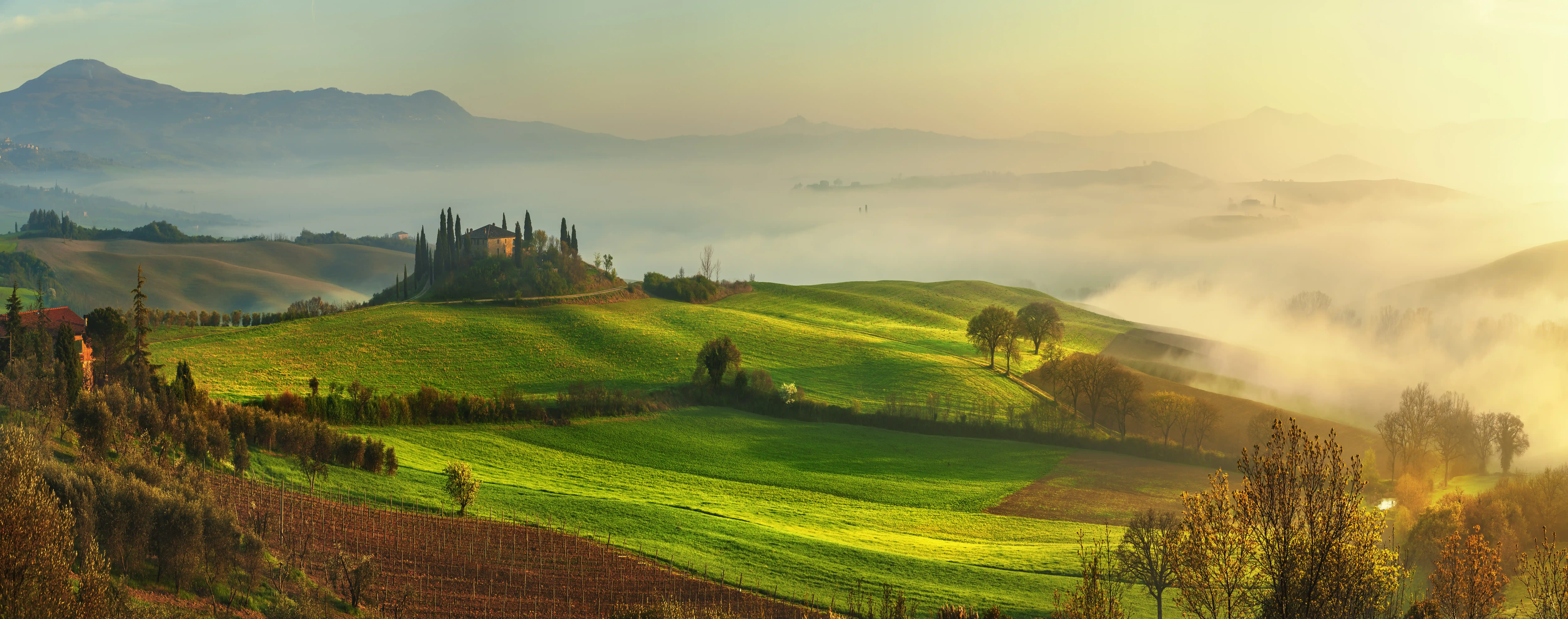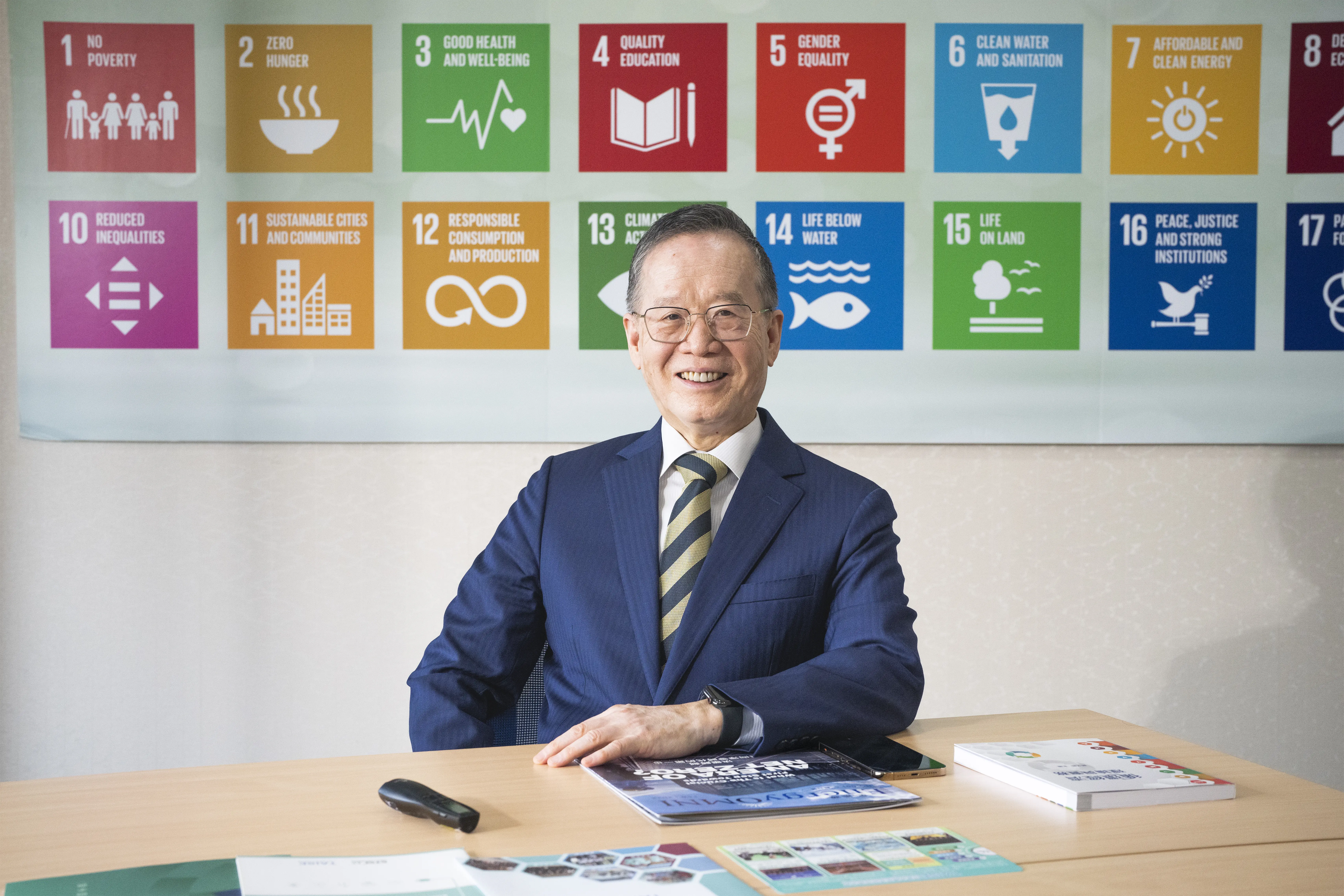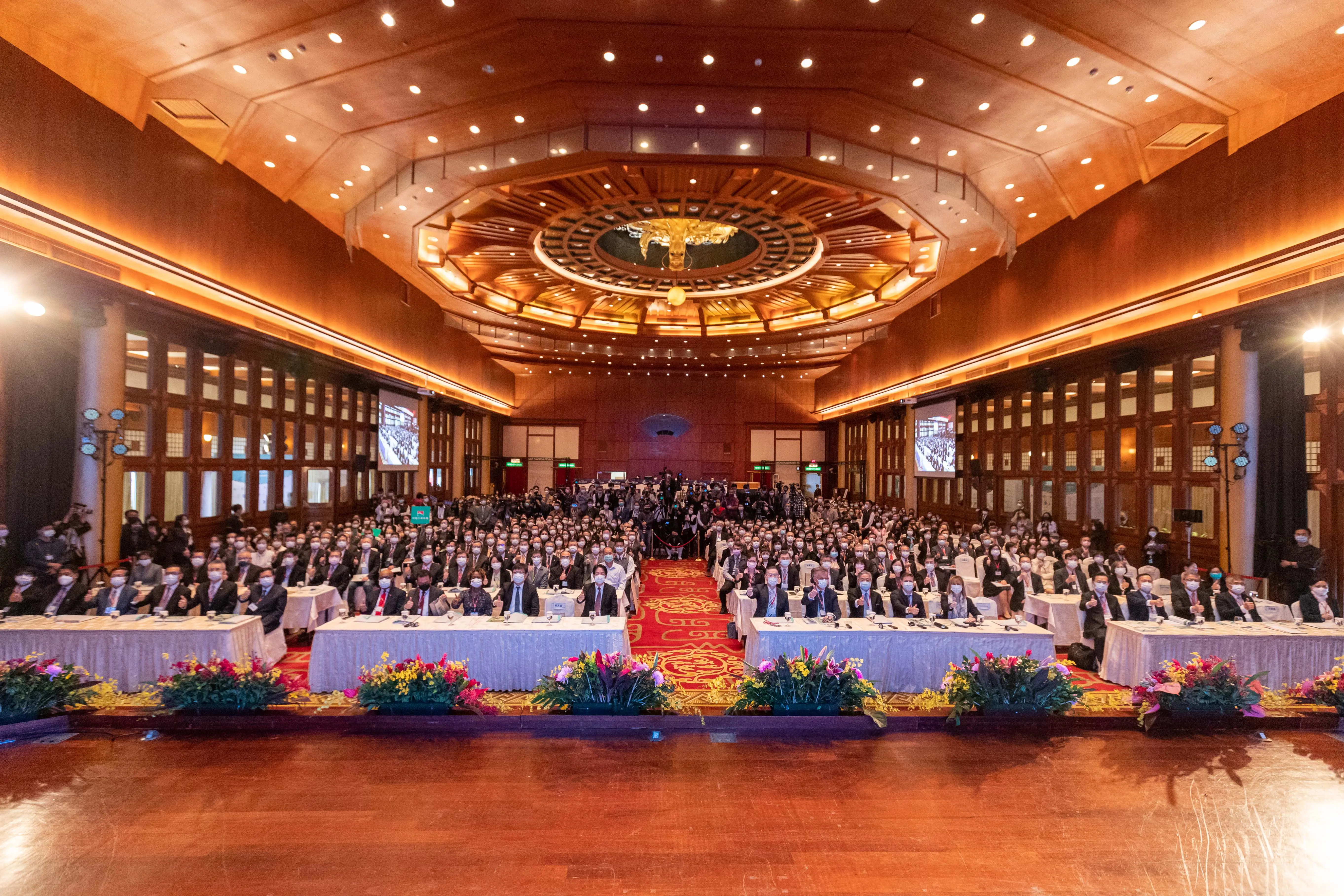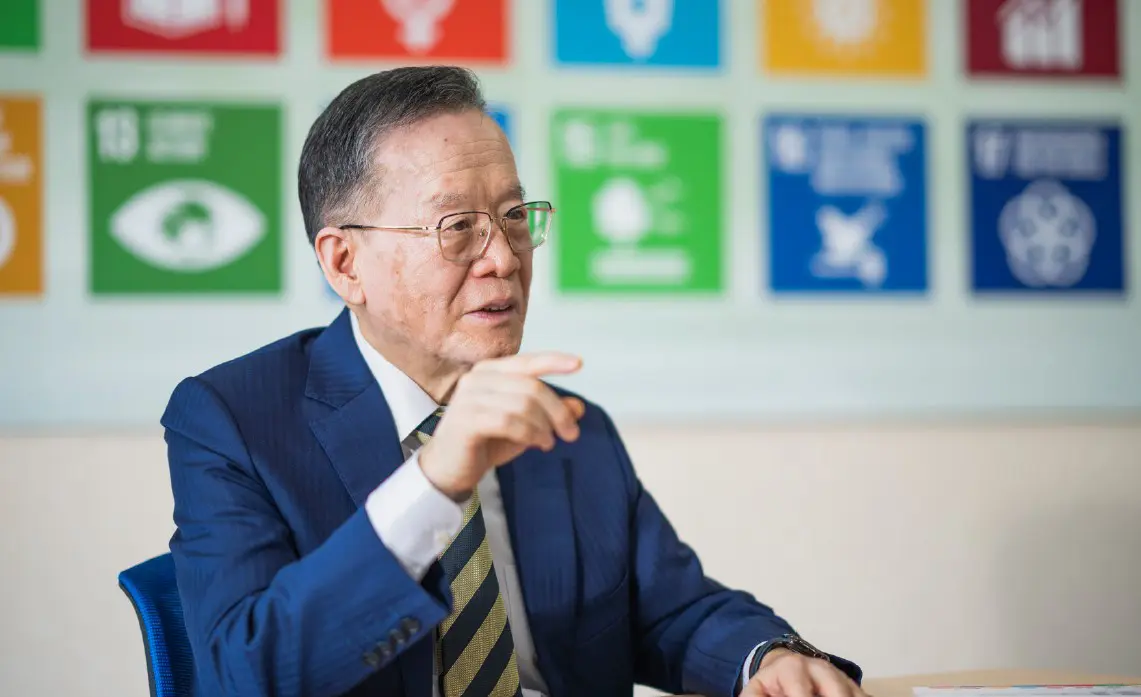Climate change has been the core value of the establishment of TAISE. When the entire world is battling climate change and stressing the importance of sustainable energies, Taiwan should align with the international standard. With such a grand task, taking a top-down approach might optimize the efforts.
Delivering the concepts of sustainability and net-zero Eugene Chien takes leadership of TAISE to the next level_Interview with Eugene Chien, the Ambassador-at-large and Director of TAISE

Delivering the concepts of sustainability and net-zero Eugene Chien takes leadership of TAISE to the next level_Interview with Eugene Chien, the Ambassador-at-large and Director of TAISE

Interview with Eugene Chien, the Ambassador-at-large and Director of TAISE
Interviewed by Xin-En Wu
Written by Mei-Hsu shih , Xin-En Wu
After the two decades since its establishment, the Taiwan Institute for Sustainable Energy (TAISE) has spared no efforts to promote the concept of sustainability though different activities. In 2021 alone, TAISE hosted 162 events, 58 speeches, and 104 radio broadcast sessions with more than forty thousand people from 43 countries. The Climate Change Painting Competition was held for primary and secondary school students. TAISE has also signed MOUs with 37 universities, launched certificate training programs to cultivate professional sustainability talents, and established the Taiwan Corporate Sustainability Awards to encourage sustainability among enterprises.
As an NGO, TAISE has made the most of its influence to promote sustainability in all possible fields. TAISE has led schools and enterprises to quickly adapt to "sustainability and net-zero" and be in line with the international standards under the leadership of Eugene Chien, the Director of TAISE and the current Ambassador-at-large of the Republic of China. Chien has not only passed down the concepts for sustainability with the spirit of a preacher but also devoted his expertise, career experiences, and professionalism, utilizing TAISE as a platform of educational promotion, talent training, and international conformance, guiding Taiwan to a better future. "Although it was not easy at the very beginning, once we took action, we have witnessed more and more people joining our cause because this is the right path," Chien stated.
Entering public service: Including the concept of "environmental protection" through education
Chien's professional career might been part of the reason for TAISE to achieve such significant influence. Appointed as the Minister of the Environmental Protection Agency (EPA) of Taiwan in 1987, the environment was completely different from the now. "Back then, there was not one incinerator nor any qualified sanitary landfills in Taiwan, not to mention the terrible air quality. We envied that people in other countries could keep their white shirts clean for days, while ours just got stained in one day," Chien joked. Moreover, it was a time when there was only sanitary sewer adequate for 3% of wastewater in Taiwan, and the level of river pollution was unimaginable with such insufficient capacity. In such dire situations, Chien assumed the term of the Minister of EPA. "The Ching-Kou Chiang Administration was under much pressure. They believed that environmental protection was essential for economic development, so the EPA was established," Chien explained.
Chien recalled, during a visit, an elementary school principal raised a question, "What is environmental protection?" A month later, a second and a third principal came and asked the same question, respectively. "If teachers at school knew nothing about environmental protection, the students would never understand either, not to mention the public." Thus, Chien decided to initiate promotional operations from the educational aspect.
When they started promoting policies through education, Chien and his staff did a lot of preparation and hosted different activities to interact with the public; however, soon, they noticed that it was tricky to convince the adults who questioned the policies. "The adults would think they have paid taxes for the government to protect the environment. So why should they even bother?" Chien recalled. That is why Chien shifted the direction and adopted different education methods for students and adults. Environmental protection education was rooted in primary and secondary schools, including innovative actions like the "alien baby recycling bins" that left a vivid impression on Generation X of Taiwan. For the adults, education through radio broadcasting proved to achieve impressive progress after two to three decades. "Currently, the average environmental awareness of Taiwanese citizens is quite phenomenal compared with other countries," Chien indicated. "I wouldn't boast that it's the best, but our progress is still relatively outstanding."
By 2000, Chien became the Minister of the Ministry of Foreign Affairs. In addition to decades of public service, Chien has also been a professor and dean of engineering college for more than ten years. He chose to enter an NGO to pass down the concept of environmental education, which he developed during his fouryear term as the Minister of EPA – the "sustainability" education.

Award-winning Artworks from the 2021 Junior High School Climate Change Painting Contest
In line with the international society – TAISE's cultivation of "sustainability"
What is the difference between sustainability and environmental protection? Chien pointed out that sustainability encompasses economic development, environmental sustainability, and social justice. "In the past, sustainability only referred to the environmental aspect, yet there was a time of intensive struggle between economy and environment in Taiwan. Many industries got suspended," Chien said. "If a good environment can only be achieved through poor economic development, what's the point of doing it if we couldn't even survive?" Chien believed that instead of such failure, people should focus on a balance between economy, society, and environmental protection, which sustainability involves. "In the past, we discussed only environmental protection; now, we should also consider economic development," Chien emphasized.
To promote sustainability, Chien determined that education is an ideal approach. Recalling the beginning of the TAISE, Chien admitted that they had to struggle against all odds. With TAISE's policy to stay as an autonomous institution, there was no support from the government or any enterprise as TAISE relied only on the income of its activities and events. However, due to Chien's experiences in the public sector, he led the staff to initiate promotion operations covering all aspects. For instance, TAISE started a radio program named "A Feverish Earth" in its third year on the Broadcasting Corporation of China, which had just celebrated its 15th anniversary. In 2021, TAISE launched a new program, "Beautiful Taiwan - Sustainable Home," on the National Education Radio, which means that TAISE now produces at least 104 radio program episodes each year. Even made the pre-recordings for the Lunar New Year holidays. Still, the TAISE team thought radio broadcasting was no longer enough and released their content on Spotify and YouTube. TAISE also hosted the Climate Change Painting Competitions for primary and secondary school students. Over the years, 12 competitions have been organized, with 19,000 participants just last year. It has further expanded on the international stage as children from 30 countries joined the event.
Encouraging enterprises to make a difference
As for the social aspect, how should education be implemented? "How can we make Taiwanese interested in sustainability? When it comes to sustainability, resources are essential, and who owns most of the resources and workforce? Businesses. We established the Taiwan Corporate Sustainability Awards," Chien explained. "It was challenging at first since most companies had no idea what sustainability means. When promoting sustainability, companies would reply that they have been offering charity donations. However, the key here was not fundraising but a suggestion of changing the company's operations entirely. The pursuit of economic development should not sacrifice environmental protection," Chien implied.

For the 1st Taiwan Corporate Sustainability Award, TAISE even invited Chin-Ping Wang, the then President of the Legislative Yuan, but only 16 companies applied. "We felt a little sad for that. Not many people care about sustainability in Taiwan, so it was tough at the beginning," Chien recalled. However, Chien and TAISE continued their work with the spirit of a preacher.
Now, sustainability has become a hot topic among Taiwanese businesses. "To apply for the contest, the company must reform their structure, but the changes will also strengthen the company's competitiveness," Chien stated. "Now, the companies participating in this event account for 73% of Taiwan Exchange's market value and more increases can be expected for this year. Also, unlisted utility companies like TaiPower and CPC have joined the cause."
In addition, to encourage sustainable investments, TAISE organized the "Taiwan Sustainable Investment Award (SIA)" for financial holdings, banks, insurance companies, investment trusts, securities, government funds, pension funds, and other institutes. This year will be the second year of the SIA. Chien indicated that sustainable investments have emerged as the mainstream nowadays, and according to the statistics, more than 2000 financial institutions worldwide have signed the United Nations ESG Investment Guidelines. More than $20 trillion of investment funds agreed to adhere to ESG principles.
Due to the significant increase in participating enterprises, TAISE also cultivated a large team of judges. "We now have the biggest team of judges in the world! Last year, more than 800 judges and many more applied. If we don't have enough judges, people will question the impartiality of the award," Chien explained. "There are two types of judges. The first type is the volunteer judges who have completed the volunteer jury program. There are around 6,000 of them, whom all earned the position through passing exams. The second type is the senior judges, usually distinguished professors, school principals, retired ministers, or business tycoons. There are about two hundred of them." Since the evaluation system is strict but transparent, the participants have never criticized the process. Chien refrained from becoming a judge himself to avoid any dispute but focused on establishing the platform for the contest and award.
Cultivation of professional talents Germinate the seeds of sustainability
With just education and awards, it is not even close to enough. Chien understood the urgency of professional talent cultivation, which is why TAISE initiated a certificate training program. The first year was challenging as always, as the staff must design the curriculum (for ten weeks with a total of eighty hours) and recruit professional lecturers. All participating students had their daytime job, so they were swamped. The class was composed of chairmen, general managers, CFOs, CSOs, university professors, etc. There is an examination for the lessons, and the passing rate was about 90 percent. A total of 580 talents were trained in five years, and 1.700 students enrolled this year. "This will change the future of Taiwan!" Chien stated. After getting the certificate, the professionals trained through this program will return to different Taiwanese cities, becoming pathfinders in developing sustainability in Taiwan.
"Earlier this year, I read it on the Economic Daily News that one of the top five popular job positions is the corporate sustainability manager," Chien said. "You see, this is where the future is taking us."
In addition, to implement the concept of sustainability in higher education, Chien also signed MOUs with different academic institutions, currently with 37 universities, as the numbers continue to increase. Chien also hopes that universities can utilize their social influences to take part in sustainability promotion.
To exhibit the achievements and promote international exchanges, TAISE also started organizing the Global Corporate Sustainability Forum every year, not even paused by the pandemic. The first and the second year attracted numerous domestic and foreign attendants. Although the event was conducted online in the third year due to the pandemic, it attracted almost three thousand participants. President Ing-wen Tsai and Vice President Ching-Te Lai also attended the event. This year, the forum was further expanded to the "Exposition for Sustainability," presenting the current progress and achievements in the form of an exposition. Chien stated that the expo would take place in August this year. Apart from the exhibition of sustainability promotion achievements, there will be opportunities for international exchanges and studies.
Utilize the experiences Making "Net -Zero" and "Sustainability" the mainstream in Taiwan
"At the very beginning, climate change has been the core for the establishment of TAISE. To promote climate change and sustainable energy concepts, TAISE also adopted the UN SDGs (Sustainable Development Goals)," indicated Chien. "For the past year, nations worldwide have been striving for progress towards these goals. Maybe it is about time for Taiwan to catch up as well." Chien points out that Taiwan has not been doing particularly well in terms of energysaving and carbon emission. Hence, he thought enterprises and government departments could be the primary force driving everyone towards the goal. "You must start from top to bottom to maximize the effects," said Chien.
To promote the concept of net-zero, Chien established the "Association of Taiwan Net Zero Emission" and the "Taiwan Alliance for Net Zero Emission (TANZE)" under TAISE. TANZE is currently participated by 27 companies, including TSMC, Foxconn, China Steel, Taiwan Cement Company, Asia Cement, etc. Chien pointed out that the carbon dioxide emission of these companies accounts for around 20% of the total carbon emission in Taiwan. Therefore, it would bring significant differences in achieving an effective emission reduction. To encourage net-zero emission among these big companies, TANZE conducts an evaluation based on the rules developed by the UN. If the enterprises pass the review, they will be awarded a medal. "For companies who announce their commitment towards netzero emission, the board of directors must first agree to initiate the net-zero project. It involves the budgeting, planning, and staffing processes only for the first year," Chien noted. "Starting from the second year, we will start to demand actual progress. The companies may also need to provide a route map, indicating the exact emission reduction for the next few years." Chien believed the implementation of net-zero emission is no longer merely an issue about eco-friendly practices, as it is becoming essential for the survival of companies under the current international trend. It is not only about compliance with the Taiwanese laws but also regulations or international standards. Problems may arise when failing to comply with export regulations.

"My method of promoting the net-zero concepts is the same as how I promoted sustainability in 2007, just with enhanced knowledge," Chien said. Net-zero, sustainability, and ESG are now the most popular issues among the Taiwanese industries, as ESG may affect companies' investments conducted and received. Taiwan has not made much progress, so to achieve the national net-zero goal by 2030. The government must speed up. Given the current international trend, different countries have set up carbon emission goals for 2030. The US intends to increase carbon emissions from 50% to 52%; the EU has increased the goal for 2030 from 40% to 55%; the UK aims to reduce 68%, while Japan set it at 46%, and Korea raised its goal to 40%. "Although our government has not made any announcement yet, the number shall not be less than the goals of these countries. Otherwise, it would be impossible for the Taiwanese industries to survive international competition," Chien noted. "For the Taiwanese companies, time is not in our favor."
When it comes to sustainability and net-zero, the issue of energy will come up. Sustainable energy includes the economy, society, and the environment. The social aspect refers to the seventh UN SDGs, "affordable and clean energy." Chien believes that "affordable energy" is the most crucial part of sustainable energy development.
"The meaning of affordable energy is explicit. Some people say that energy in Taiwan is already too cheap, which is true, but who defines affordable price? Can the disadvantaged groups afford the additional cost? We often speak of transformational justice, but what happens after the transformation? Can these people survive? Affordable energy is a fundamental concept for sustainable energy. It is a social problem, not just an energy or economic issue," Chien emphasized. "For instance, the discussion for offshore wind power is mostly about technical problems. Although the technical problem is crucial, the success of offshore wind power does not rely upon only the technicality but also on other structural issues in the aspects of fishermen, power companies, networks, etc. The fishermen's livelihood is a social problem. In energy transformation, you should never ruin the fishermen's living as it contradicts the goal of providing affordable energy while ensuring everyone's survival.
Chien then pointed out that the biggest problem in Taiwan's energy policy is the plan without a clear timeline. "The current plan only covers the path until 2025. What about 2026?" He suggested that both the government and private companies draft plans for longer terms and prepare for them.
More related articles
